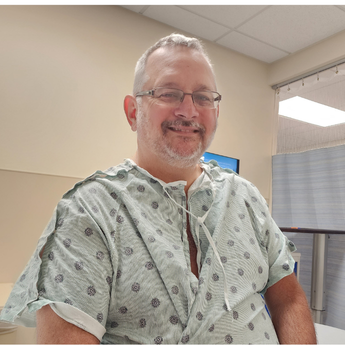By Adriana Ermter
In our monthly column, senior writer and editor Adriana Ermter shares her personal experiences with breast cancer.
I don’t know what it was like for you but for me, saying “I have breast cancer” out loud felt fake, like I was lying. Every time the words came out of my mouth I wanted to hide. Rationally, I knew my diagnosis was real, but the horrible emotions that preceded and followed each proclamation filled me with shame. And the voice inside my head was relentless. It just kept goading me on.
It accused me of using the big C for attention, sympathy, and as a get-out-of-jail-free card to use to keep myself in a fantasyland where I would never actually have to do the hard work to achieve the goals and the life I want. It intensified the five million questions rattling around in my brain and the anxiety I couldn’t shake. It was fucked; I felt fucked. So, trust me when I tell you: in the early months of my diagnosis, I told as few people as possible.
Feel your feelings and share your diagnosis anyways
Emotions like guilt, anger, sadness, loneliness, dread and even shame are frequent fliers with a breast cancer diagnosis. That’s because unlike other illnesses, breast cancer impacts our sense of self and our future—all while striking at the core of our femininity and body image. It challenges who we are and how we want to live. Yet, being open about your diagnosis with your people, the ones who truly love and support you, can provide immense relief through emotional support, practical help, and it can give you a sense of solidarity.
Telling your inner circle
My inner circle is small, and my sharing with them was a mishmash. I told my two sisters first and by text, as they live in Calgary and I’m in Toronto. I followed up with them later, over the phone. My besties received a text (yup, this is our lives on smartphones), then phone calls and finally, I had a face-to-face with each of them where we hugged and talked it out. Because my parents were vacationing in Mexico, and I was literally on my way to join them two days after my diagnosis, I told them in person beneath a palm tree.
How you choose to tell your inner circle is entirely up to you. Whether it’s a face-to-face conversation, a group get together or even a group text, know that you don’t have to have all the information or answers when you do decide to talk. Share what you’re comfortable with and ask for support.
Telling the kids
While I don’t have my own children and didn’t have to go through this, what I do know is that when it comes to telling your children, timing and simplicity are crucial. My sisters and their husbands told my nieces and nephews (they both have one of each) on my behalf and picked a time when they could be fully present when they shared. This was particularly important for my one niece and nephew, who were only 10 and 12 years old when I was diagnosed. My sister and I debated telling them because they were so young, but in the end, it was decided that telling the truth was better than keeping a secret. Both of my sisters fielded their kids’ questions- “Was I going to get better?” or “Was I going to die?” -for me, which I greatly appreciated because it meant that all I had to do was continue sharing my love with them. Kids worry, so while my sisters acknowledged that breast cancer is serious, they both made sure to reassure their children that I was working with the doctors to get better. I believe their honest responses helped the kids feel more secure.
Disclosing to your employer
Deciding when and how to tell your employer about your breast cancer diagnosis can be challenging. I chose to tell my supervisor, her boss, and the head of human resources (HR) all at the same time, in the same room, immediately after my diagnosis. I also told them that I had breast cancer, but you’re not obligated to disclose this. It is a good idea, though, to inform them if your condition will affect your work. I did this and I created a plan detailing the dates I would need off for surgery and post-operation recovery, my treatment timeline for when I would be at the hospital, and so on. The company I worked for at the time did not have short-term disability and as a single woman, I needed to work to pay the bills, so having a plan was crucial for me.
Here are a few ways to tell your employer:
- Request a private meeting with your supervisor or HR to discuss your situation calmly and professionally. I put this request in an email to ensure I had a paper trail proving my transparency and professionalism. After the meeting, I followed up with another email outlining what was shared and the next steps that were discussed and agreed upon.
- Send an email or letter explaining your diagnosis and how it may impact your job, including any accommodations you might need.
- Connect with your HR representative and ask them to speak directly to your supervisor. This can be especially beneficial if you are uncomfortable or have a strained relationship with your supervisor as the HR rep can handle the communication for you.
Regardless of who you confide in first, make sure to assert your boundaries and set the precedent for future discussions by saying something like this: "I prefer to keep the details of my diagnosis private, but am happy to discuss how it may impact my work and what accommodations I might need."
- Do share: That you have a medical condition, how it might impact your work, any necessary adjustments or accommodations, and your expected treatment schedule.
- Do not share: Personal details about your diagnosis or treatment that you are not comfortable sharing or that does not affect your work. This maintains your privacy and keeps the conversation professional.
- Do: Expect questions about how your work will be affected and what accommodations you might need.
Do: Answer questions directly and professionally. If an employer asks inappropriate questions about your health, you have the right to decline to answer.
How to tell someone you’re dating or have just started a relationship with
I was single, single, single when I was diagnosed, so I did not have to go through this. But breast cancer friends of mine have and this is what they have shared with me. They recommend waiting until the relationship shows signs of becoming serious and you have built a foundation of trust before you share your diagnosis. Choose a quiet, private place to talk openly and without distractions, and make sure you leave time for questions and reflection on both of your parts. Expect questions about your health, treatment and how this affects your future together. It’s also important to set boundaries on what you feel comfortable sharing. If they ask questions that you’re not ready to answer, you can say: "I appreciate your concern, but I’m not ready to discuss that part yet."
Your diagnosis is yours alone. Prioritize your privacy and wellbeing, by telling those who love you and want to support you, and by sharing with others only when you feel the time is right.
Adriana Ermter is a multi award-winning writer and editor. Her work can be read in Sotheby’s Insight, Living Luxe and IN Magazine, as well as online at 29Secrets.com, RethinkBreastCancer.ca, Popsugar.com and AmongMen.com. The former Beauty Director for FASHION and Editor-in-Chief for Salon and Childview magazines lives in Toronto with her two very spoiled rescue cats, Murphy and Olive. You can follow Adriana on Instagram @AdrianaErmter.







